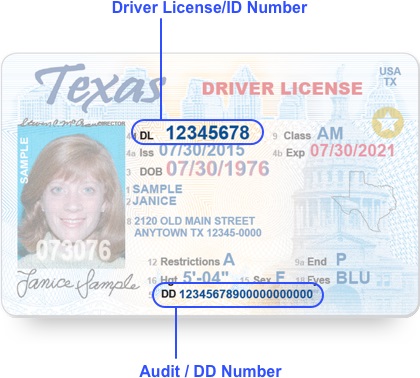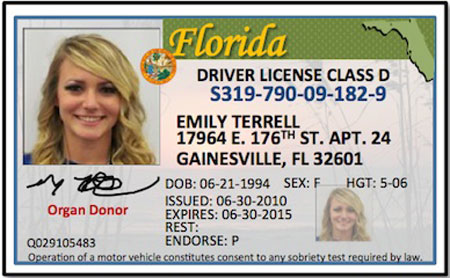From the job opportunities in Texas' fast-growing cities to its natural beauty and its delicious BBQ, there are plenty of reasons to move to the Lone Star State. Though relocating to Texas can be a rewarding decision, out-of-state moves can also be stressful due to the logistical challenges. Among them, of course, is transferring your out-of-state license to Texas. Fortunately, if you follow these steps and you have a clean driving record, you'll have your Texas drivers license in no time.
Step 1: Get Your Vehicle Inspected
New residents with a valid out-of-state drivers license have 90 days to transfer it to Texas, but vehicle owners only have 30 days to register their car in the Lone Star State. Before you can register your car in Texas, you'll need to have it inspected at a Texas Department of Public Safety (DPS) certified inspection station. In Texas, vehicles must be inspected annually to ensure that all their safety features are in working order. Don't forget to bring along your proof of insurance to complete this step.
Tags: Texas, Texas Department of Public Safety, trending If you get a new driver’s license, identification card or license to carry card this week in the state of Texas, you may notice a new design. Driver License Endorsements and Restrictions Endorsements. Individuals may apply for an endorsement to be placed on their driver license. Depending on the type of endorsement, an individual may be required to provide additional information, complete a separate application, or pass a knowledge test specific to the type of endorsement the individual is seeking. TXDMV COVID-19 RELATED INFORMATION. The Temporary Waiver of Vehicle Title and Registration Requirements Will End April 14, 2021. Visit the TxDMV Covid-19 Page for Information. Though registering your car in Texas is a fairly straightforward process, keep in mind that your initial registration can cost more than $200. Step 3: Get Your Texas Drivers License. The final step toward becoming a legal Texas driver is turning in your out-of-state ID for a brand new Texas drivers license. Renew your Texas driver license or ID card online with the Texas Department of Public Safety (DPS). If you have moved, use this service to change the address on your Texas driver license or ID.
Step 2: Register Your Vehicle

Once your inspection is taken care of, the next step toward becoming a legal Texas driver is registering your vehicle at your county tax collector's office. To do this, you'll need to bring along:

- Proof of your completed vehicle inspection
- Your insurance card and your printed policy (if you still have an out-of-state plan) to ensure that you have the necessary coverage
- A completed 130-U application form
- Your car title or proof of ownership
Though registering your car in Texas is a fairly straightforward process, keep in mind that your initial registration can cost more than $200.
Step 3: Get Your Texas Drivers License
The final step toward becoming a legal Texas driver is turning in your out-of-state ID for a brand new Texas drivers license. To do this, you'll need to visit a Texas DPS office. Though the DPS doesn't allow you to make appointments for this type of visit, residents of the state's busiest metropolitan areas (Dallas, Houston, San Antonio and Austin) are able to add their names to the DPS's waiting list online.
On your visit to the DPS, you'll need to bring:
- Original documents proving your identity, social security number and legal status (more info on the required documents is available here)
- Proof of your Texas residency
- Your vehicle's registration and your insurance card
- Your out-of-state drivers license, which you'll be required to forfeit

Once you've completed this step, you're official ... almost. You'll get a temporary license at the DPS and your official Texas drivers license will be sent to you in the mail. Happy driving!
Texas
Adult Drivers Ed
- TDLR Approved Course—For Ages 18 and Up (#C3244)
- America's #1 Driving School—Most Selected Course Provider
- An engaging, self-paced, 6-hour course
- Free mobile course app
- No written test at the DPS! Official test included

Related Articles
DMV Cheat Sheet - Time Saver
Passing the Texas written exam has never been easier. It's like having the answers before you take the test.
- Computer, tablet, or iPhone
- Just print and go to the DPS
- Driver's license, motorcycle, and CDL
- 100% money back guarantee
In Texas, a Class C driver's license will allow you to operate most standard passenger vehicles. However, a special license or certificate may be required for certain types of vehicles or driving professions not meeting the definition of a passenger vehicle.
Below are the requirements for vehicles that may need additional licenses as outlined by the laws and regulations of the state of Texas.
TX Commercial Driver's License
To operate commercial vehicles in Texas, a commercial driver's license (CDL) may be required.
Whether or not you need to apply for a Class A, B, or C Texas CDL will depend on:
- Vehicle type.
- Weight of thevehicle OR of the combination of vehicles being towed.
- Number of potential passengers.
- Materials being transported.

In addition to obtaining a commercial driver's license, some vehicles may also require an additional endorsement.
A few of the common vehicles that may require a CDL include:
- A tractor-trailer.
- A school bus.
- Tankers.
- Double or triple trailers.
- Shuttles.
- City buses.
- Some construction vehicles.
Texas Drivers License Restriction Codes
For more information about the requirements for a CDL, which endorsements you may need, and how to apply, here are some guides that may help you:
For-Hire Driver Requirements
In the state of Texas, the Department of Public Safety (DPS) does not have state-wide requirements in place for hired drivers to obtain a special driver's license.
However, each city or district within the state may have its own requirements. This includes for:
- Taxi drivers.
- Limousine drivers.
- Other chauffeurs.
Depending on the company you'll be working for and the city you'll be working in, for-hire drivers may be required to:
- Meet a minimum age requirement.
- Provide proof of citizenship.
- Agree to a criminal background check.
- Agree to a driving history check.
- Submit an application to the city.
- You may also be required to have a contract from an approved company. Some cities require for-hire drivers to be represented by a company before you can apply.
- Complete required training, such as:
- Training classes conducted by the city.
- On-the-job company training.
- Complete a medical examination completed by a registered medical doctor.
- Pass a written examination.
- Pay the required fees.
Texas Drivers License Restriction Code G
Upon completion of the requirements, the city will provide documentation and permits stating your qualifications to operate for-hire vehicles within the specified district. For more information on the exact requirements to operate as a taxi driver, chauffeur, limousine driver, or similar occupation, contact your city transportation department.
Other Vehicle Licensing Requirements
Texas Drivers License G Restriction
For some vehicles in the state of Texas that are exempt from a CDL, you may still be required to apply for a Class A, B, C, or M non-commercial driver's license.
These vehicles include:
- Firefighting or emergency vehicles.
- Military vehicles.
- Recreational vehicles (RVs).
- Farming vehicles.
- Motorcycles.
You may be required to adhere to safety guidelines and meet minimum age requirements unless you are accompanied by a supervising driver.